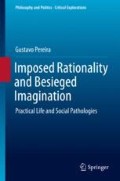Abstract
The third articulating element of practical life is reflection, which is presented as the agents’ capacity to consider themselves from an external perspective, evaluate their own beliefs, desires and emotions, and confirm, reconfigure or reject them. This reflective exercise enables agents to evaluate their own positions and others’ through the interpersonal and intrapersonal relationships established in practical life, as well as their criticism, reformulation or confirmation. In this section, Korsgaard’s and Frankfurt’s positions are taken as starting points, and are reformulated and radicalized in intersubjectivist terms, from a perspective that is sensitive to vulnerability. In turn, reflection can be classified according to different exercise intensities, which also allows us to establish degrees of vulnerability to social pathologies. Finally, in this chapter I present the concept of normative friction as a trigger for reflective processes that can lead to the revision, transformation and criticism of beliefs, structures and social relationships, and of distinctive circumstances of social pathologies. Normative friction is a particular case of the concept of cognitive dissonance introduced by Festinger, and has its field of application in the questions of practical life, while cognitive dissonance is more comprehensive and can be experienced, for example, in the field of basic or experimental sciences.
Access this chapter
Tax calculation will be finalised at checkout
Purchases are for personal use only
Notes
- 1.
I have previously termed this concept moral friction (Pereira 2009). Now I use the term normative friction because it is more comprehensive in allowing us to account for the different contexts of practical life, not just moral ones.
References
Barvosa-Carter, Edwina. 2007. Mestiza Autonomy as a Relational Autonomy. Ambivalence and the Social Character of the Will. The Journal of Political Philosophy 15 (1): 1–21.
Cooper, Joel. 2007. Cognitive Dissonance: Fifty Years of a Classic Theory. London: Sage.
Elster, Jon. 1983. Sour Grapes: Studies in the Subversion of Rationality. Paris/Cambridge: Maison des Sciences de l’Homme/Cambridge University Press.
Festinger, Leon. 1962. A Theory of Cognitive Dissonance. Stanford: Stanford University Press.
Frankfurt, Harry. 1998a. Freedom of the Will and the Concept of a Person. In The Importance of What We Care About: Philosophical Essays, 11–25. Cambridge/New York: Cambridge University Press.
———. 1998b. Identification and Wholeheartedness. In The Importance of What We Care About: Philosophical Essays, 159–176. Cambridge/New York: Cambridge University Press.
Kahneman, Daniel. 2011. Thinking, Fast and Slow. New York: Farrar, Straus and Giroux.
Kahneman, Daniel, Paul Slovic, and Amos Tversky, eds. 1982. Judgment Under Uncertainty: Heuristic and Biases. Cambridge: Cambridge University Press.
Korsgaard, Christine. 1996. The Sources of Normativity. Cambridge: Cambridge University Press.
Meyers, Diana T. 2000. Intersectional Identity and the Authentic Self. In Relational autonomy: Feminist Perspectives on Autonomy, Agency and the Social Self, ed. Catriona Mackenzie and Natalie Stoljar, 151–180. New York: Oxford University Press.
Modzelewski, Helena. 2017. Emociones, educación y democracia: una proyección de la teoría de las emociones de Martha Nussbaum. México: Instituto de Investigaciones Filosóficas-UNAM.
Munro, Alice. 2009. Too Much Happiness: Stories. New York: Alfred A. Knopf.
Pereira, Gustavo. 2009. Autonomía, intersubjetividad y consumo. Sistema 210: 53–70.
———. 2013. Elements of a Critical Theory of Justice. Houndmills: Palgrave Macmillan.
Solomon, Robert. 2007. True to Our Feelings. What Our Emotions Are Really Telling Us. Oxford: Oxford University Press.
Stanovich, Keith E. 2011. Rationality and the Reflective Mind. Oxford: Oxford University Press.
Taylor, Charles. 1985. What Is Human Agency? In Philosophical Papers: Human Agency and Language, Vol. 1, 15–47. Cambridge: Cambridge University Press.
Author information
Authors and Affiliations
Rights and permissions
Copyright information
© 2019 Springer Nature Switzerland AG
About this chapter
Cite this chapter
Pereira, G. (2019). Reflection. In: Imposed Rationality and Besieged Imagination. Philosophy and Politics - Critical Explorations, vol 9. Springer, Cham. https://doi.org/10.1007/978-3-030-26520-5_3
Download citation
DOI: https://doi.org/10.1007/978-3-030-26520-5_3
Published:
Publisher Name: Springer, Cham
Print ISBN: 978-3-030-26519-9
Online ISBN: 978-3-030-26520-5
eBook Packages: Religion and PhilosophyPhilosophy and Religion (R0)

